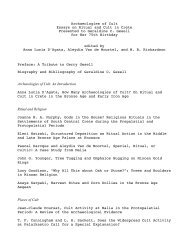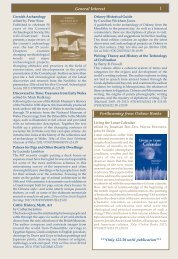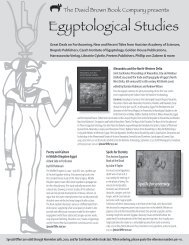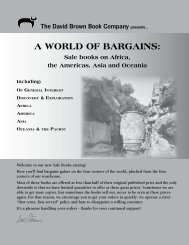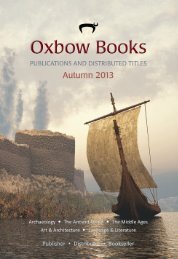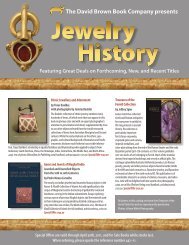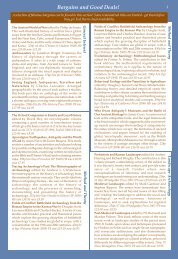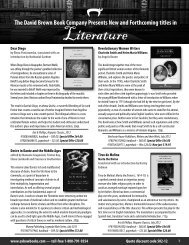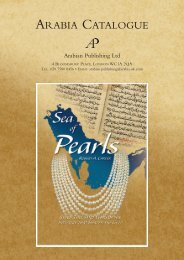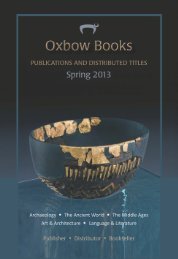New Distributed Titles Fall 2009 - Oxbow Books
New Distributed Titles Fall 2009 - Oxbow Books
New Distributed Titles Fall 2009 - Oxbow Books
Create successful ePaper yourself
Turn your PDF publications into a flip-book with our unique Google optimized e-Paper software.
Maney Publishing<br />
The Wallenstein Figure in German Literature<br />
and Historiography 1790–1920<br />
by Steffan Davies<br />
Albrecht von Wallenstein (1583–1634), one of the most famous and controversial personalities of the<br />
Thirty Years War, gained heightened prominence in the nineteenth century through Schiller’s monumental<br />
drama, Wallenstein (1798–99). Schiller’s own fame, and the complexities he injected into his<br />
dramatic character, made Wallenstein a potent, near-mythical, but also highly ambivalent figure. This<br />
innovative and detailed study tests Schiller’s impact on historians as well as on later literary texts. It<br />
traces Wallenstein’s part in the construction of identity in Germany, Austria and Bohemia, examining the<br />
figure’s significance in events such as the Wars of Liberation against France, the 1859 Schiller festival, and<br />
the First World War. The broad range of authors and historians studied includes Franz Grillparzer, Leopold<br />
von Ranke, Ricarda Huch and Alfred Döblin.<br />
200p, hardback, 9781906540289, $82.00, Maney Publishing, December <strong>2009</strong>,<br />
MHRA Texts and Dissertations 76, Bithell Series 36.<br />
The Power of Disturbance<br />
Elsa Morante’s Aracoeli<br />
edited by Sara Fortuna and Manuele Gragnolati<br />
Aracoeli (1982) was the last novel written by Elsa Morante (1912–<br />
85), one of the most significant Italian writers of the twentieth<br />
century. The journey, both geographical and memorial, of a homosexual<br />
son in search of his dead mother is a first-person narrative<br />
that has puzzled many critics for its darkness and despair. By<br />
combining scholars from different disciplines and cultural traditions,<br />
this volume reevaluates the esthetical and theoretical complexity of<br />
Morante’s novel and argues that it engages with crucial philosophical<br />
and epistemological questions in an original and profound way. Contributors explore the manifold<br />
tensions staged by the novel in connection with contemporary philosophical discourse (from feminist/<br />
queer to political theory to psychoanalysis) and authors (such as Emilio Gadda, Pier Paolo Pasolini and<br />
Pedro Almodovar). The Power of Disturbance shows that by creating a ‘hallucinatory’ representation of<br />
the relationship between mother and child, Aracoeli questions the classical distinction between subject<br />
and object, and proposes an altogether new and subversive kind of writing.<br />
200p, hardback, 9781906540500, $89.50, Maney Publishing, July <strong>2009</strong>, Legenda Main Series.<br />
Hamann’s Prophetic Mission<br />
A Genetic Study of Three Late Works against the Englightenment<br />
by Timothy Beech<br />
literary studies<br />
The Spirit of England<br />
Selected Essays of Stephen Medcalf<br />
edited by Brian Cummings<br />
and Gabriel Josipovici<br />
Stephen Medcalf (1937–2006) was an essayist, in the best<br />
traditional sense of that calling: a writer not of books but of<br />
substantial and justly celebrated essays, widely read in the<br />
Times Literary Supplement and elsewhere. Medcalf’s abiding<br />
question to the world was the Psalmist’s: ‘What is man<br />
that thou art mindful of him?’ His was a Blakean sense of<br />
Englishness, far from the chocolate-box painting or the television<br />
adaptation, and for him the strongest writers were those<br />
keenly aware of their roots in the classical, Anglo-Saxon or<br />
Celtic past. By gathering together Medcalf’s most important<br />
work, this volume shows the coherence of his thinking, and of<br />
the elusive, complicated literary heritage he celebrated, one<br />
which acknowledges the Greco-Roman strain, the Christian<br />
strain, down-to-earth humor and sly irony.<br />
200p, hardback, 9781906540371, $89.50, Maney Publishing,<br />
October <strong>2009</strong>, Legenda Main Series.<br />
Johann Georg Hamann (1730–88) was one of the most radical and sophisticated critics of the German Enlightenment. The three late works Konxompax, Metakritik über<br />
den Purismum der Vernunft and Golgatha und Scheblimini!, written between 1779 and 1784, are polemics against iconic texts by the Enlightenment luminaries Lessing,<br />
Kant and Mendelssohn. This diverse and rich material, ranging from the Fragmentenstreit to Kant’s first Critique, is refracted through Hamann’s radical Lutheranism, with<br />
freemasonry and the pagan mystery religions adding lurid apocalyptic highlights. Hamann’s idiosyncratic style and heavily intertextual manner of composition give his<br />
works a fascinating and teasing complexity and put his writing at odds with the period’s preferred ideals of ease and elegance. For these reasons, he is a standing provocation<br />
to our assumptions about the 18th century.<br />
200p, hardback, 9781906540227, $82.00, Maney Publishing, September <strong>2009</strong>, MHRA Texts and Dissertations 74, Bithell Series 34.<br />
www.dbbconline.com 79



